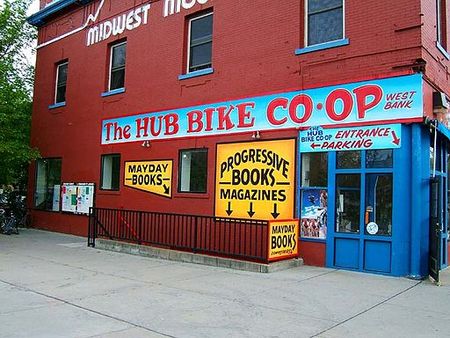Mayday Books

Mayday Books is a volunteer-run, non-profit collective bookstore in Minneapolis, Minnesota. Established in 1975, its organizational mission is to provide leftist political books and magazines and a space for political organizing for the Minneapolis/Saint Paul metropolitan area. Mayday Books carries a selection of new and used political books, magazines, zines, T-shirts, postcards, and select CDs and DVDs. Numerous political organizations use the collective's space for their public meetings. The collective regularly hosts author readings, film screenings, political discussions, organizational meetings, and occasional celebrations. Among the many prominent activist groups that meet at Mayday Books, the Iraq Peace Action Coalition (IPAC) meets in the store space, where in 2008 it planned the permitted anti-war march against the Republican National Convention on September 1, 2008.
Excerpt from the Wikipedia article Mayday Books (License: CC BY-SA 3.0, Authors, Images).Mayday Books
Cedar Avenue South, Minneapolis
Geographical coordinates (GPS) Address Nearby Places Show on map
Geographical coordinates (GPS)
| Latitude | Longitude |
|---|---|
| N 44.97098 ° | E -93.24697 ° |
Address
Cedar Avenue South 301
55454 Minneapolis
Minnesota, United States
Open on Google Maps








